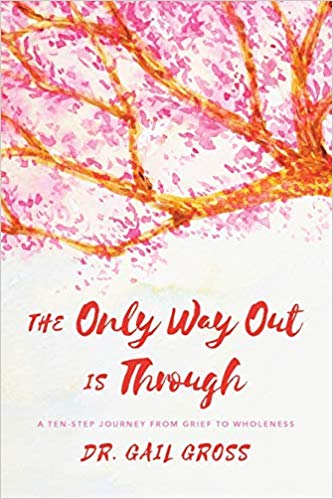
I shared a brief excerpt from my book, The Only Way Out Is Through in my last blog post, and will share the continuation of that post here. I hope you enjoy it!
Hedonism is an extreme overreaction. However, things that you can find to do that will ease your pain and are creative, expressive, and joyful—such as art, journaling, dance, and music—should be instituted right here, at the beginning. And even though you might not want to go out to dinner, or do simple things like go to a movie, your behavior modification model invites you into action.
It takes a tremendous amount of energy to repress your feelings. Thus, if you discount and hold down your feelings, or follow the grieving style of others, and if you are ashamed to cry or afraid to laugh, you will develop a pattern of negativity that can become your future lifestyle. The idea is to catch a glimpse of the pattern driving and compelling your behavior and to redeem it. By taking back your projected material, you can free up all of the energy that you are using to suppress your authentic feelings. This is your creative energy, and when you recapture it, you can use it to heal and transform.
So, back to the conscious choices of this stage of reality: it is important to pay attention to your physical and emotional needs—to take care of yourself, to be gentle and nurture yourself, and especially rest. Furthermore, you are still alive and have to pay attention to the practicalities of living, such as cooking, cleaning, and taking care of your work and social calendar. As a result, you have to create a routine for yourself that you can follow as a discipline. This will be difficult at first—even getting up out of bed at this beginning period of grief is a huge endeavor. But little by little, the consistency of every day repatterning will create a new way of living—a habit, if you will—that will help you reenter the world.
Men and women handle this stage differently, which is another reason why they have such a hard time helping each other grieve. In this earliest period, a man feels that he has forfeited his role as protector and problem solver as he is no longer able to protect and has come up against a problem he can never solve. Something terrible has happened, and it is completely out of his control. Suddenly, thrust into an emotional crisis, he is made impotent.
Because he has to go back to work and support his family, he has to find a way to cope. This can lead him to both compartmentalize and distract himself from his feelings. His wife, on the other hand, is living her feelings and looking to connect for solace.
Women typically are all about relationships, responding to a primitive need for other women to help them with birth, child care, and survival. Men, on the other hand, compartmentalize in an effort to protect and provide for their mate and progeny. Here is the point of tension, reflecting the two most significant differences in the way in which men and women grieve. Thus you can see why this stage requires compassionate, candid, and open communication. When pain is overpowering and you find yourself back in the day-to-day of life, it is important to pay attention to the little things that you can do, for both yourself and your mate, recognizing that it is only your mate who can understand the depth of your sorrow.
People who grieve can live again. The key is to give yourself permission to grieve. Such feelings are so powerful that if you do not experience and express them, they remain inside, causing illness and even death. Take inner time for yourself through journaling, meditation, prayer, and any creative activity that allows you to express actively what is difficult to express verbally.
Painting, arts and crafts, and music are all ideal, connecting you back to the simple language of your Soul. If possible, find a grief counselor to guide you and your family through this process, so that at a certain time, on a specific date, you will confront your grief in a safe and contained environment. Also, when necessary, your counselor may consider the multidisciplinary approach of counseling, medication, and behavior modification.
Right now, think about those things that will help to complete this strategy:
- Take care of yourself. Nurture yourself and get plenty of rest.
- Create a routine that helps you pay attention to the practicalities of life, including your work and social calendar. Getting back into a routine will give you a sense of control and help return you to a pattern of balance and stability.
- Recognize that men and women grieve differently, and use my empathic process to reestablish a connection with your mate and other family members.
- Create new routines and new rituals to help you through the grieving process. Rituals allow you to begin anew, reconnecting you to your inner core and thus guiding you up out of the descent. Such rituals can include meditation, yoga, and journaling (including gratitude journals). Practice as a discipline whatever rituals you start on your own . . . daily.
- List three things you’d like to let go of in your life (things, people, and feelings) and do it.
I will share one more excerpt from the book this week. Stay tuned!
Be sure to look for The Only Way Out is Through: a Ten Step Journey from Grief to Wholeness on Amazon and Barnes and Noble.
And, be sure to follow me on Facebook, Twitter, and Instagram for the latest.

